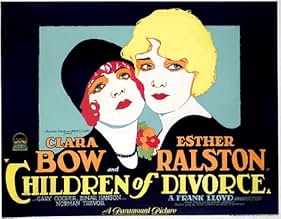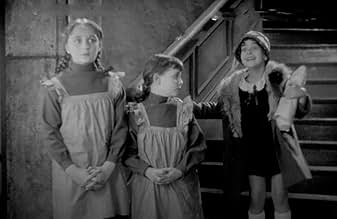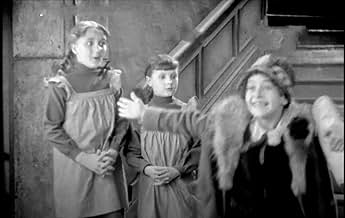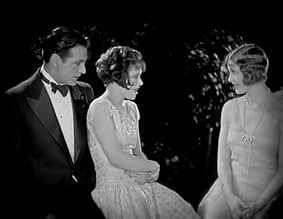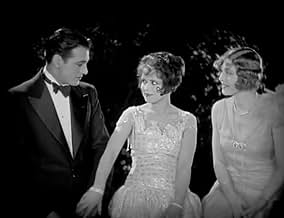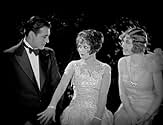A young flapper tricks her childhood sweetheart into marrying her. He really loves another woman, but didn't marry her for fear the marriage would end in divorce, like his parents'. Complica... Read allA young flapper tricks her childhood sweetheart into marrying her. He really loves another woman, but didn't marry her for fear the marriage would end in divorce, like his parents'. Complications ensue.A young flapper tricks her childhood sweetheart into marrying her. He really loves another woman, but didn't marry her for fear the marriage would end in divorce, like his parents'. Complications ensue.
Catherine Cotter
- Boarding School Student
- (uncredited)
Bill Elliott
- Party Guest
- (uncredited)
Featured reviews
Early in the 20th century, divorced ex-pat Americans living in Paris dropped their unwanted children at the local convents and visited them only when their busy schedules permitted. Kitty and Jean were among these lonely children, and the pair quickly become friends. One day, a young boy, Edward, who was also a child of divorced parents, appears, and both girls are smitten with him. Years pass, and the three meet up again in the U.S., where a romantic triangle develops, which expands into a square, when a gold-digging prince enters the scene. "Children of Divorce," which was written by Adela Rogers St. Johns from a novel by Owen McMahon Johnson, is a sudsy melodrama, whose dated appeal lies, not in the story, but in the stars.
The "It" girl herself plays the adult Kitty; vivacious Clara Bow is wonderful as the sexually aggressive woman, who needs to marry well. Jean, Kitty's protector as a child and now described as the richest woman in America, has grown into lovely Esther Ralston. Ralston, who seems to have been largely forgotten, gives a naturalistic performance as a caring understanding woman, who is capable of self sacrifice. However, Jean's money is like catnip to the impoverished Prince Ludovico, played by Einar Hanson, and his uncle, Duke Henri, played by Norman Trevor. But the Prince and his uncle have to compete with tall lanky Gary Cooper of the piercing blue eyes, who captivates both Jean and Kitty. As the adult Edward, Cooper has it all: startling good looks, wealth, education, and lack of ambition. Besides the three stars, Hedda Hopper as Kitty's self-absorbed mother also makes an impression, although the rest of the cast has unfortunately fallen into obscurity.
Besides the melodramatic plot, a few aspects of this silent film may be off putting to general audiences. While the sets are convincing, they are so tall they disappear into the clouds, and the gargantuan doors dwarf the performers. Although a few flourishes of the grand style intrude, the acting is generally natural and underplayed. The film is short, even shorter if the inter-titles are taken into account, and director Frank Lloyd maintains a good pace. However, "Children of Divorce" will likely appeal primarily to silent-film buffs. Already attuned to both the limitations and the pleasures of pre-sound movies, aficionados of silent cinema can overlook the unconvincing drama and relish the luminous stars. Indeed, they had faces then, and Clara Bow, Gary Cooper, and Esther Ralston provide ample evidence herein.
The "It" girl herself plays the adult Kitty; vivacious Clara Bow is wonderful as the sexually aggressive woman, who needs to marry well. Jean, Kitty's protector as a child and now described as the richest woman in America, has grown into lovely Esther Ralston. Ralston, who seems to have been largely forgotten, gives a naturalistic performance as a caring understanding woman, who is capable of self sacrifice. However, Jean's money is like catnip to the impoverished Prince Ludovico, played by Einar Hanson, and his uncle, Duke Henri, played by Norman Trevor. But the Prince and his uncle have to compete with tall lanky Gary Cooper of the piercing blue eyes, who captivates both Jean and Kitty. As the adult Edward, Cooper has it all: startling good looks, wealth, education, and lack of ambition. Besides the three stars, Hedda Hopper as Kitty's self-absorbed mother also makes an impression, although the rest of the cast has unfortunately fallen into obscurity.
Besides the melodramatic plot, a few aspects of this silent film may be off putting to general audiences. While the sets are convincing, they are so tall they disappear into the clouds, and the gargantuan doors dwarf the performers. Although a few flourishes of the grand style intrude, the acting is generally natural and underplayed. The film is short, even shorter if the inter-titles are taken into account, and director Frank Lloyd maintains a good pace. However, "Children of Divorce" will likely appeal primarily to silent-film buffs. Already attuned to both the limitations and the pleasures of pre-sound movies, aficionados of silent cinema can overlook the unconvincing drama and relish the luminous stars. Indeed, they had faces then, and Clara Bow, Gary Cooper, and Esther Ralston provide ample evidence herein.
Marriages, divorces,..mariages,divorce, ... ok, ok, , you want enjoy Life, but what about the children Hearts ?
This movie is a divorce trial and of wedding trial. To Avoid divorce try to succeed your marriage, it's seems evident but haw many people really think of that ?
Traumatised by abandon Kitty & Jean wanted 2 things, first never divorce, so make a good marriage.
It's such a moving Clara, who make you cry for sure, apparently she's seems happy, but inside juste broken and desperate, she always made the wrong things, thinking of course they was the best things to do,...
A movie who is still topical , even if actually divorced children are no longer abandonned.
Eternal questions: What is the way to succeed a marriage ? If it fails, divorce is a solution but how doing it softly for kids ? etc...
This movie is a divorce trial and of wedding trial. To Avoid divorce try to succeed your marriage, it's seems evident but haw many people really think of that ?
Traumatised by abandon Kitty & Jean wanted 2 things, first never divorce, so make a good marriage.
It's such a moving Clara, who make you cry for sure, apparently she's seems happy, but inside juste broken and desperate, she always made the wrong things, thinking of course they was the best things to do,...
A movie who is still topical , even if actually divorced children are no longer abandonned.
Eternal questions: What is the way to succeed a marriage ? If it fails, divorce is a solution but how doing it softly for kids ? etc...
"Children of Divorce" (1927) is a melodramatic love triangle directed by Frank Lloyd, and starring Clara Bow, Esther Ralston and Gary Cooper. In 1927, the Cooper stock was on the rise. Gary had met Clara Bow in a party just after she had finished her signature film "It" (1927). They quickly became "special friends", and Bow insisted that Coop must be inserted into her new film, even though it was finished and all but one of the sets had been destroyed. But the studio was forced to agree with their star, and Josef von Sternberg filmed a quick scene with Cooper as a reporter, and it was added to the film. This is all told very well in Larry Swindell's book "The Last Hero: A Biography of Gary Cooper" (1981).
By their next onscreen encounter, Cooper was elevated to be the male lead, albeit in a very female centric melodrama. "Children of Divorce" is a morality tale that asks, whether children of divorced couples are more likely to become divorcees themselves. Thus, its attempt is to glorify the sacred nature of marriage by casting shame on divorced couples. It's not a subtle film. Like many a silent film, it begins with the characters as children. All three, Jean (Ralston), Kitty (Bow) and Ted (Cooper) were raised in a children's home run by nuns, because their rich, divorced parents couldn't bother to take care of the kids themselves. As they grow up, Jean and Ted are in love and want to marry, but Kitty also has an eye for Ted.
The contrast between Jean and Kitty is shown to be night and day. Jean is respectful, "wife material" so to say, while Kitty is a carefree flapper who likes to have fun. During a night when he gets drunk, Kitty tricks Ted into marrying him, and when it's announced that they are going to have a child, Jean won't allow Ted to divorce Kitty, because then world would have one more child of divorce. If you can't guess the outcome, you probably haven't watched too many silent melodramas.
I have mixed feelings about this film. The core merit it has going on, is the presence of Bow and Cooper, who are both very charismatic. The film is worth watching solely because of them. I dislike films that give such a black and white separation of good girls and bad girls. From my perspective, probably from today's perspective, Ralston appears boring and lifeless, while Clara Bow's charm has not been damaged by the years. I for one would love to wake up and discover myself married to a girl like Kitty. The film is heavy-handed with its marital themes, and it feels like it tries to brainwash the female audience into obedient housewives and dutiful mothers. Clara Bow is another alternative for a female role model, and therefore must be destroyed. "It" presented Bow's sex appeal in a lively way, and allowed it to exist. This film looks down on her, even if she is the star.
I also have never liked the American notion of "childhood sweethearts must marry as adults" in films. This is nonsense. It is very unlikely, that the first person of the opposite sex that you meet, is going to be the most suitable marital candidate you will ever meet. Therefore films like this, that tell the audience how Ted and Jean must be re-united, because they loved each other a long time ago, don't really hit home for me. There is even a creepy scene, where Ted stares at Jean, who is comforting his child, and imagines Jean as a little girl. It played the wrong way in this context, sorry.
So all in all, as a narrative, this doesn't hold up even a bit. But it does show how Cooper can act and led to better parts for him. Clara Bow may be the bad woman here, but she is easily the most memorable thing in the film.
By their next onscreen encounter, Cooper was elevated to be the male lead, albeit in a very female centric melodrama. "Children of Divorce" is a morality tale that asks, whether children of divorced couples are more likely to become divorcees themselves. Thus, its attempt is to glorify the sacred nature of marriage by casting shame on divorced couples. It's not a subtle film. Like many a silent film, it begins with the characters as children. All three, Jean (Ralston), Kitty (Bow) and Ted (Cooper) were raised in a children's home run by nuns, because their rich, divorced parents couldn't bother to take care of the kids themselves. As they grow up, Jean and Ted are in love and want to marry, but Kitty also has an eye for Ted.
The contrast between Jean and Kitty is shown to be night and day. Jean is respectful, "wife material" so to say, while Kitty is a carefree flapper who likes to have fun. During a night when he gets drunk, Kitty tricks Ted into marrying him, and when it's announced that they are going to have a child, Jean won't allow Ted to divorce Kitty, because then world would have one more child of divorce. If you can't guess the outcome, you probably haven't watched too many silent melodramas.
I have mixed feelings about this film. The core merit it has going on, is the presence of Bow and Cooper, who are both very charismatic. The film is worth watching solely because of them. I dislike films that give such a black and white separation of good girls and bad girls. From my perspective, probably from today's perspective, Ralston appears boring and lifeless, while Clara Bow's charm has not been damaged by the years. I for one would love to wake up and discover myself married to a girl like Kitty. The film is heavy-handed with its marital themes, and it feels like it tries to brainwash the female audience into obedient housewives and dutiful mothers. Clara Bow is another alternative for a female role model, and therefore must be destroyed. "It" presented Bow's sex appeal in a lively way, and allowed it to exist. This film looks down on her, even if she is the star.
I also have never liked the American notion of "childhood sweethearts must marry as adults" in films. This is nonsense. It is very unlikely, that the first person of the opposite sex that you meet, is going to be the most suitable marital candidate you will ever meet. Therefore films like this, that tell the audience how Ted and Jean must be re-united, because they loved each other a long time ago, don't really hit home for me. There is even a creepy scene, where Ted stares at Jean, who is comforting his child, and imagines Jean as a little girl. It played the wrong way in this context, sorry.
So all in all, as a narrative, this doesn't hold up even a bit. But it does show how Cooper can act and led to better parts for him. Clara Bow may be the bad woman here, but she is easily the most memorable thing in the film.
The Frank Lloyd directed film, April 1927's "Children of Divorce," opens at a Catholic divorce colony where recently-single parents who can't afford to raise kids by themselves drop off their children on a temporary basis. The children actors playing the three leads form a close bond, with Ted (Cooper) promising to marry Jean (Ralston) when they grow up while Kitty (Bow) looks on. But as adults, flapper Jean gets Ted drunk at a party and marries him, much to the consternation of intended lover Jean.
Ralston claims being on the set with the 22-year-old Clara was both enjoyable and scandalous. She recalls Bow describing in detail where and how she and her actor boyfriend Cooper made love, causing cast members to experience a red glow on their faces listening to such escapades. Bow also saved Cooper's budding career by intervening on his behalf when Lloyd threatened to release the young actor for constantly not remembering his movements in a early scene. Cooper's visibility in "Children of Divorce" catapulted his screen presence, launching him towards Hollywood stardom.
As for Clara, "Children of Divorce" provided her with one of the most dramatic scenes in her growing portfolio. Near the film's ending, Bow's character swallows poison because she realizes she can't marry a prince. She lays in bed comforted by her childhood friend Jean, who forgives her for her past indiscretions. The dramatic sequence's atmosphere required more than director Lloyd provided. So Paramount brought in young director, Josef von Sternberg, who was gaining a reputation for his expert lighting, to reshoot Kitty's final moments. His genius was to provide the shadow of a curtain sweeping over her as the nun lowers the wondow drape, emphasizing the end of Kitty's tempestuous life.
Ralston claims being on the set with the 22-year-old Clara was both enjoyable and scandalous. She recalls Bow describing in detail where and how she and her actor boyfriend Cooper made love, causing cast members to experience a red glow on their faces listening to such escapades. Bow also saved Cooper's budding career by intervening on his behalf when Lloyd threatened to release the young actor for constantly not remembering his movements in a early scene. Cooper's visibility in "Children of Divorce" catapulted his screen presence, launching him towards Hollywood stardom.
As for Clara, "Children of Divorce" provided her with one of the most dramatic scenes in her growing portfolio. Near the film's ending, Bow's character swallows poison because she realizes she can't marry a prince. She lays in bed comforted by her childhood friend Jean, who forgives her for her past indiscretions. The dramatic sequence's atmosphere required more than director Lloyd provided. So Paramount brought in young director, Josef von Sternberg, who was gaining a reputation for his expert lighting, to reshoot Kitty's final moments. His genius was to provide the shadow of a curtain sweeping over her as the nun lowers the wondow drape, emphasizing the end of Kitty's tempestuous life.
This tragic silent movie completely lives up to its title. The beginning of the movie shows a school for children whose parents are busy getting a European divorce. One mother drops her daughter off without a care in the world, and the lonely child quickly gets taken under the wing of a more experienced girl, whose mother is on her fourth divorce. The girls become very close, but a boy comes between them.
The older girl sees a boy at the "orphanage" and vows to marry him when she's older. She grows up into Esther Ralston, and the younger girl grows up to become Clara Bow. The boy is Gary Cooper, and while he and Esther have feelings for one another, Esther isn't as pushy as the beautiful flapper. Clara is impulsive and doesn't let a little thing like friendship stand in her way. After all, how can a child of divorce really respect and value marriage?
You've been warned: this is a heavy movie, and you'll probably shed a tear by the time it's all over. But if you love watching Clara Bow movies or want to see Gary Cooper in a silent movie, you can give it a chance.
The older girl sees a boy at the "orphanage" and vows to marry him when she's older. She grows up into Esther Ralston, and the younger girl grows up to become Clara Bow. The boy is Gary Cooper, and while he and Esther have feelings for one another, Esther isn't as pushy as the beautiful flapper. Clara is impulsive and doesn't let a little thing like friendship stand in her way. After all, how can a child of divorce really respect and value marriage?
You've been warned: this is a heavy movie, and you'll probably shed a tear by the time it's all over. But if you love watching Clara Bow movies or want to see Gary Cooper in a silent movie, you can give it a chance.
Did you know
- TriviaJosef von Sternberg was called in by Paramount to reshoot some scenes, shoot new scenes and recut the existing footage after executives made the determination that the film was not releasable.
- Quotes
Kitty Flanders: You'd make a marvelous second husband but you are too much of a luxury for a poor girl's first husband.
- ConnectionsFeatured in Hollywood (1980)
- How long is Children of Divorce?Powered by Alexa
Details
- Runtime
- 1h 10m(70 min)
- Sound mix
- Aspect ratio
- 1.33 : 1
Contribute to this page
Suggest an edit or add missing content


